Wissenschaftsschwerpunkt "Globalisierung der Weltwirtschaft"
“Science, Technology and Innovation Policies for Inclusive Growth in Africa" – this is the title of two forthcoming volumes of the African Development Perspectives Yearbook which are prepared now by a group of international experts. The Editorial Committee of the African Development Perspectives Yearbook has decided to split the scheduled volume 20 (for 2018) into two volumes, the volume 20 (for 2018) and the volume 21 (for 2019). This was considered as advisable because of the great number of high quality submissions of manuscripts to the Editors. While Volume 20 will consider Basic Issues of STI (Science, Technology and Innovation) policies in Africa and Country Cases for Sub-Saharan Africa, the Volume 21 will present Issues of Human Resources Development in the Digital Age, Country Cases for North Africa, and Book Reviews and Book Notes.
In Volume 20 of the African Development Perspectives Yearbook essays on the linkages of inclusive growth, sustainable development and STI policies will be presented in the Introductory Unit. Also successful cases of STI development in Africa and STI systemic issues will be analysed. Focus countries are Sudan and Nigeria. Professor Samia Satti Nour, Khartoum University, Sudan and Professor Reuben A. Alabi, Ambrose Alli University, Ekpoma, Nigeria and currently Guest Researcher at IWIM/University of Bremen, were nominated as co-editors of the Units on Sudan and Nigeria and as Volume Editors; both have accepted the invitation. UNESCO Regional Science Policy Adviser Hassan Nazar, UNESCO Cairo Office, Egypt will be the co-editor of the Unit on Basic Issues of STI policies in Africa.
For Volume 21 (2019) essays are prepared for a Unit on Human Resources Development in Africa in the Digital Age, based on case studies for Cameroon and Nigeria. Country cases in North Africa are Egypt, Tunisia and Algeria. As usual, a strong Unit on Book Reviews and Book Notes rounds up the Volume 21. Again, UNESCO Regional Science Policy Adviser Hassan Nazar, UNESCO Office Cairo, Egypt will be the co-editor of the Unit on North Africa. Professor Achim Gutowski is again responsible for the Unit with Book Reviews and Book Notes. Professor Tobias Knedlik as the Managing Editor and Professor Karl Wohlmuth as the Scientific Co-ordinator are the other volume editors for the two forthcoming issues.
The African Development Perspectives Yearbook has over the decades - the first volume has appeared in 1989 – become the major English-language publication on Africa in Germany. The response to the annual International Calls for Papers is huge, with an increasing interest on the side of African experts and experts from international and regional African organisations. UNCTAD/ Geneva, UNESCO/ Cairo, and the African Capacity Building Foundation (ACBF)/Nairobi, Kenya are the institutional cooperation partners for these two volumes. UNECA in Kigali, Rwanda has organized the book launch for the volumes 18 and 19 of the African Development Perspectives Yearbook in October 2016. This was a great event, with TV appearances in 48 African countries. The Research Group on African Development Perspectives Bremen, which is editing the Yearbook, is also involved in researches, advisory work, and training activities. In 2019 the Research Group will celebrate the “30 years birthday ceremony” of the African Development Perspectives Yearbook.
Professor Karl Wohlmuth is co-author of a new study on employment creation in Tunisia. This is a reworked version of the study which was published in 2016 in German, Arabic and French languages. Main issue is how to develop a new employment strategy for Tunisia amidst dangers of increasing unemployment and spreading political instability. The authors provide a frame for employment policies consisting of three strategic elements. Element One considers the long overdue need for a pro-active policy towards small and medium enterprises in Tunisia. Element Two addresses the need to integrate Tunisian enterprises in a more effective way into global and regional value chains. Element Three focuses on the need to start a broad-based reindustrialization process in Tunisia and to manage in a better way the deindustrialization process in the field of old industries. Also the trade policy and implementation issues of the proposed strategy are discussed. There is a great interest of Tunisian policymakers in this strategic approach towards employment creation. Governmental and non-governmental institutions in Tunisia and various donor agencies are working now on solid foundations for a an operational employment strategy and policy for Tunisia. The Council of Economic Advisers of Tunisia has established a working group on these issues. Despite of the importance of the employment issue not too many studies were done so far on employment policies for Tunisia.
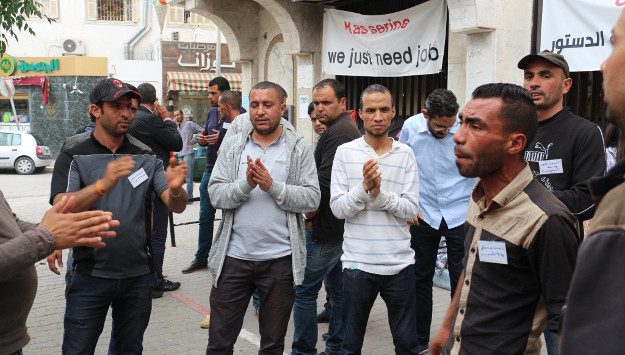
Photo: More Jobs, Higher Wages Essential for Tunisian Growth, Middle East Institute, May 20, 2016
The National Dialogue on Employment of March 2016 raised the issue of employment creation again and presented an Eleven-Point Plan, and UN Secretary-General Ban Ki-moon emphasized during the meeting the necessity to keep the theme of job creation at the centre of policymaking to preserve Tunisia’s democratic gains (see the report by Mabrouka M’Barek: More Jobs, Higher Wages Essential for Tunisian Growth, Middle East Institute, May 20, 2016, Web Access: http://www.mei.edu/content/article/more-jobs-higher-wages-essential-tunisian-growth).
The four versions of the study by the three development economists:
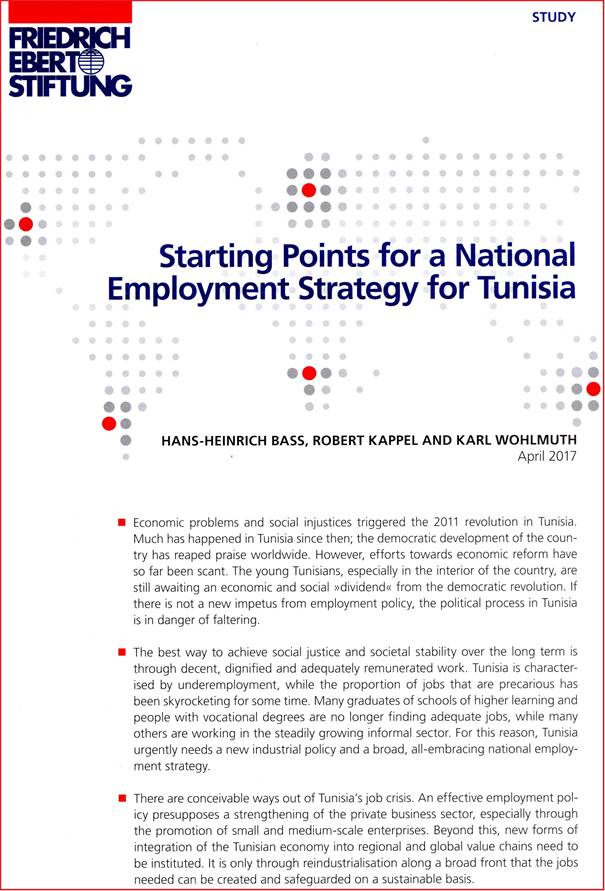
Download: https://www.fes.de/de/partner-der-friedrich-ebert-stiftung-erhalten-den-friedensnobelpreis/fes-publikationen-zu-tunesien/ and
http://www.fes.de/t3php/publ_int.php?&f_ABC=tunis&f_RSW=tunesien&logik=or&t_listen=x&sortierung=jab&t3titel=Tunesien
The Study:
Bass, Hans-Heinrich; Kappel, Robert; Wohlmuth, Karl
Starting points for a national employment strategy for Tunisia / Hans-Heinrich Bass, Robert Kappel und Karl Wohlmuth. - Berlin : Friedrich-Ebert-Stiftung, Dep. for Middle East and North Africa, April 2017. - 17 Seiten = 250 KB, PDF-File. - (Study / Friedrich-Ebert-Stiftung)
Einheitssacht.: Ansatzpunkte einer nationalen Beschäftigungsstrategie für Tunesien . -
Electronic ed.: Berlin : FES, 2017
ISBN 978-3-95861-753-7
http://library.fes.de/pdf-files/iez/13336.pdf
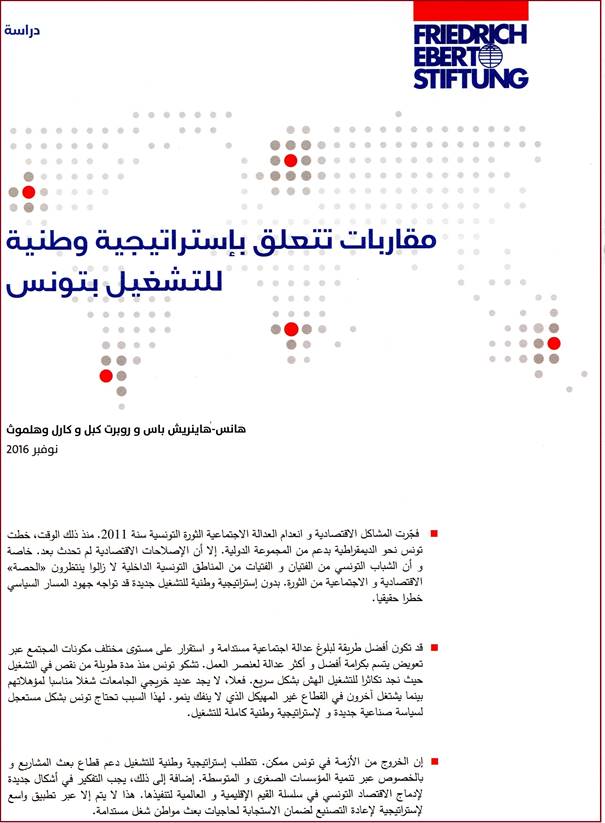
Download: https://www.fes.de/de/partner-der-friedrich-ebert-stiftung-erhalten-den-friedensnobelpreis/fes-publikationen-zu-tunesien/ and
http://www.fes.de/t3php/publ_int.php?&f_ABC=tunis&f_RSW=tunesien&logik=or&t_listen=x&sortierung=jab&t3titel=Tunesien
The Study:
Bass, Hans-Heinrich; Kappel, Robert; Wohlmuth, Karl
[Approches relatives à une stratégie nationale pour l'emploi en Tunisie / Hans-Heinrich Bass, Robert Kappel und Karl Wohlmuth]. - [Tunis : Friedrich-Ebert-Stiftung, Projet Regional "Politiques Economiques pour la justice sociale", Décembre 2016]. - 16 Seiten = 340 KB, PDF-File. -
Einheitssacht.: Ansatzpunkte einer nationalen Beschäftigungsstrategie für Tunesien . -
Electronic ed.: Tunis : FES, 2017. - Arabic text and script
http://library.fes.de/pdf-files/bueros/tunesien/13338.pdf
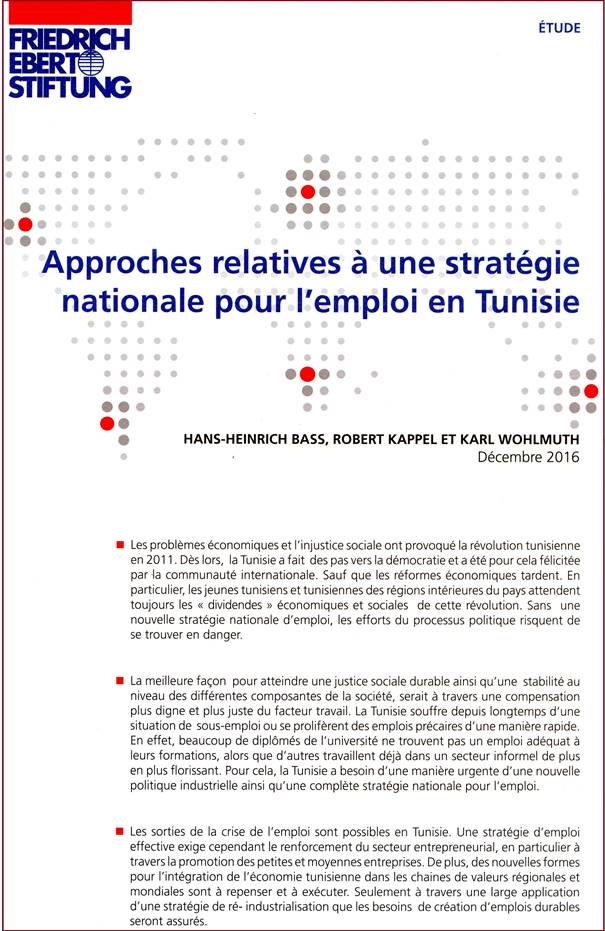
Download: https://www.fes.de/de/partner-der-friedrich-ebert-stiftung-erhalten-den-friedensnobelpreis/fes-publikationen-zu-tunesien/ and
http://www.fes.de/t3php/publ_int.php?&f_ABC=tunis&f_RSW=tunesien&logik=or&t_listen=x&sortierung=jab&t3titel=Tunesien
The Study:
Bass, Hans-Heinrich; Kappel, Robert; Wohlmuth, Karl
Approches relatives à une stratégie nationale pour l'emploi en Tunisie / Hans-Heinrich Bass, Robert Kappel und Karl Wohlmuth. - Tunis : Friedrich-Ebert-Stiftung, Projet Regional "Politiques Economiques pour la justice sociale", Décembre 2016. - 16 Seiten = 125 KB, PDF-File. - (Étude / Friedrich-Ebert-Stiftung)
Einheitssacht.: Ansatzpunkte einer nationalen Beschäftigungsstrategie für Tunesien . -
Electronic ed.: Tunis : FES, 2017
http://library.fes.de/pdf-files/bueros/tunesien/13337.pdf
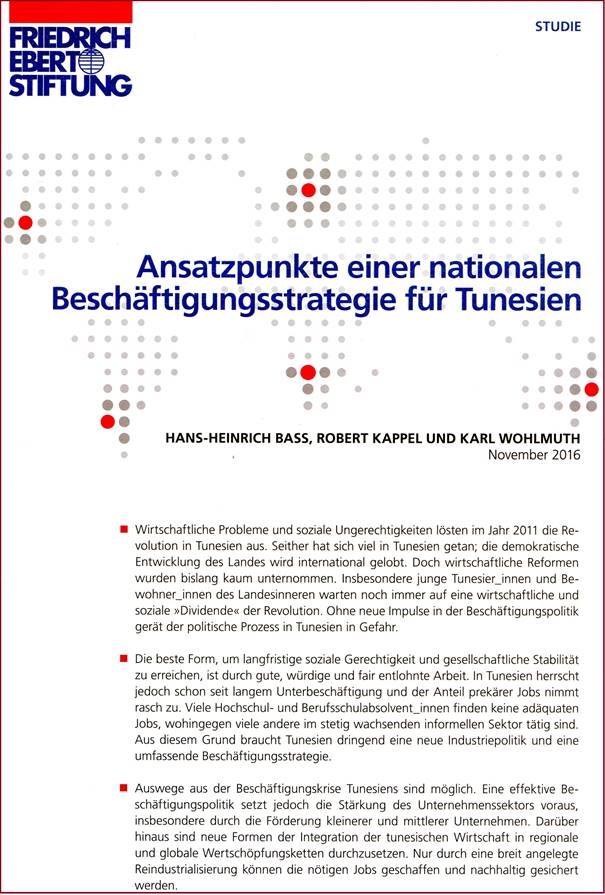
Download: https://www.fes.de/de/partner-der-friedrich-ebert-stiftung-erhalten-den-friedensnobelpreis/fes-publikationen-zu-tunesien/ and
http://www.fes.de/t3php/publ_int.php?&f_ABC=tunis&f_RSW=tunesien&logik=or&t_listen=x&sortierung=jab&t3titel=Tunesien
The Study:
Bass, Hans-Heinrich; Kappel, Robert; Wohlmuth, Karl
Ansatzpunkte einer nationalen Beschäftigungsstrategie für Tunesien / Hans-Heinrich Bass, Robert Kappel und Karl Wohlmuth. - Berlin : Friedrich-Ebert-Stiftung, Naher / Mittlerer Osten und Nordafrika, November 2016. - 17 Seiten = 215 KB, PDF-File. - (Studie / Friedrich-Ebert-Stiftung)
Electronic ed.: Berlin : FES, 2016
ISBN 978-3-95861-599-1
http://library.fes.de/pdf-files/iez/12921.pdf
Professor Karl Wohlmuth was in recent months active as an adviser to research projects, conferences and publications (see some projects below):
Professor Wohlmuth was invited by the President of the UN Economic and Social Council to participate at the Global ECOSOC Conference in Victoria Falls, Zimbabwe as a speaker on “Industrialization based on Agricultural Development”. Global Meetings in Dakar, Victoria Falls and New York City emphasize the role of Sustainable Development Goal Nine (SDG 9) on Sustainable Industrialization, Infrastructure Development and Innovation. This will be an ongoing task of ECOSOC. ECOSOC has the lead in implementing the 17 SDGs.
Guest researcher Professor Reuben A. Alabi extends his research stay in Bremen for three more years. The new Research Programme for 2018-2020 was recently presented as a Letter of Intentions and discussed with Professor Wohlmuth. It has three major components, comprising major policy issues of agroindustry development in Nigeria (Crop productivity, Public expenditure for agriculture at state level, and Combatting youth unemployment through agriculture development).
Professor Alabi was appointed in March 2017 as a Full Professor of Agricultural Economics at Ambrose Alli University in Ekpoma, Edo State, Nigeria. The Dean of the Faculty of Economics and Business Studies of the University of Bremen, Professor Jochen Zimmermann, had extended the invitation. Professor Wohlmuth is working as a consultant and senior project adviser in these projects.
Preparations are ongoing for the research visit of Professor Chunji Yun, Faculty of Economics, Seinan Gakuin University, Fukuoka-City, Japan. He will work for a year in Bremen on the research topic of “Production Integration and Labour Market Interdependencies in the European Union.” This is his second research visit at IWIM for a period of one year. The Dean has extended an invitation to him for a year.
Further on, Professor Wohlmuth has advised the research project of Yves Bagna who has constructed a new “Porter Competitiveness Index”, based on Porter’s Diamond Theory. Throughout the research period Professor Wohlmuth was the main adviser to the project. The book is now published by the Research Institute of IWVWW e. V. at Berlin, and further essays on the methodology are forthcoming. Yves Bagna has also compared the new “Porter Competitiveness Index” with the long-established “Global Competitiveness Index” of the Word Economic Forum. Yves Bagna, an engineer and economist from Cameroon, has during his research also visited the Institute of Professor Michael Porter at the Harvard Business School.
Also, Professor Wohlmuth was active to review a chapter for a new UNIDO book about Industrialization in Africa, in his function as the lead author of the chapter. He has also revised and extended a background paper on the issues for UNIDO.
In addition, Professor Wohlmuth has peer-reviewed articles for international and African journals, such as the prestigious journal Comparative Economic Studies. As the number of African refereed journals increases, the demand for evaluations rises. Members of the Research Group on African Development Perspectives Bremen are invited to support such activities.
Work on the volumes 20 and 21 of the African Development Perspectives Yearbook is progressing. On Science, Technology and Innovation (STI) Policies in Sudan, a cooperation is under way with Professor Samia Satti Nour from the University of Khartoum, a leading international expert on STI policies. The Cooperation, which is targeting on issues of “Science, Technology and Innovation Policies for Sudan”, is advancing towards a separate Unit (a collection of papers) in Volume 20. A Unit on “STI Frameworks for Africa” is prepared in Cooperation with Patrick N. Osakwe, UNCTAD, Geneva and Nazar Hassan, UNESCO, Cairo. A Unit on STI Policies in Nigeria is done in cooperation with Professor Alabi. Other Units will be prepared on issues of Human Resources Development and STI, on STI Policies in North Africa, and on Publications on STI Policies: Book Reviews and Book Notes.
The Friedrich Ebert Foundation (FES) Tunisia has published four language versions (English, French, Arabic, German) of a study on “Elements of an Employment Strategy for Tunisia”. Professor Wohlmuth is one of the three authors, a joint work of three development economists working on Africa since decades.
Various publications were released by Professor Wohlmuth on the middle class in Africa, on deindustrialization and reindustrialization in Tunisia, on transformative regional integration in Africa, and on guidelines for policymakers in Africa to promote global and regional value chains.
The debate about the role of global value chains (GVCs) in African development is still ongoing. All international and regional development organizations have something to say on these issues, and there are proposals and demands addressed to African policymakers how they could use the integration into GVCs for income growth, productivity growth, employment creation, poverty reduction, and trade diversification. GVCs are now considered as a major tool to reach inclusive growth in Africa. World Bank and OECD refer to inclusive GVCs; the African Economic Outlook for 2014 (by OECD, African Development Bank, and UNDP) links GVCs with successful industrialization in Africa; the World Economic Forum refers to policies which allow for tapping the potential of GVCs for African development; ILO investigates the employment opportunities being associated with a deeper integration into GVCs; OECD, WTO and World Bank analyse the challenges, opportunities, and policy implications of GVCs; OECD addresses those instruments which may help policymakers in developing countries to pursue their GVC agenda; UNCTAD outlines policies to integrate developing countries’ SMEs (small and medium enterprises) into GVCs; WTO addresses the tasks of policymakers to manage GVCs in a changing world economy; UN’s Department of Economic and Social Affairs (UN-ESA) looks at ways to strengthen capacities of policymakers to develop competitive value chains; the African Development Bank considers the options of policymakers for climbing value chains; UNIDO relates GVCs to agroindustry development; and UNECA looks at policy implications for promoting global value chains (GVCs) and regional value chains (RVCs).The list could be continued, as there is a rich collection of guidelines available now for promoting integration of local enterprises into GVCs.
Professor Karl Wohlmuth has published a report in the journal “Berichte” to synthesize some of these views. The report is done in the form of a Guide for Policymakers enabling them to exploit by coherent policies the opportunities for African Development of integrating local enterprises into GVCs. The report draws on recommendations of international organizations and on lessons from case studies which were written for the volumes 18 and 19 of the African Development Perspectives Yearbook.
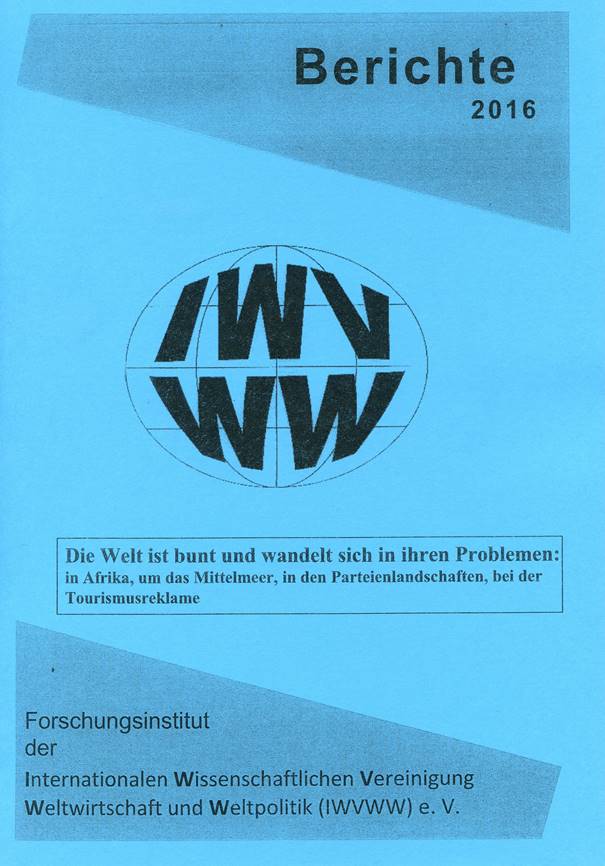
Bibliographic Information:
Wohlmuth, Karl, 2016, Global Value Chains and African Development – Key Issues addressed to Policymakers, pages 4-30, “Berichte”, 2016, Volume 26, Number 210, ISSN 1022-3258, Berlin, IWVWW e. V.
The report has two parts. In part one basic issues of global value chains (GVCs) when interacting with African local economies are discussed. Major questions are: How can Africa develop capabilities and preconditions for a beneficial integration of its producers into global value chains? What do we know about the depth and the forms of Africa’s integration into regional and global value chains? Are the sub-regional and local development impacts of Africa’s participation in regional and global value chains gainful? In order to guide the policymakers on GVCs it is necessary to collect information on these issues first.
In part two some strategic implications of the analysis are presented, with the purpose to formulate the core elements of the guideline. Five priority areas for action emerge and have to be considered by policymakers so that the African country and its enterprises can gain from global value chains (GVCs): First priority is, Developing the Key Capabilities for GVC Participation; second priority is, Identifying the Power Structures within the GVCs; third priority is, Assessing the Relevance of the Various Transmission Channels; fourth priority is, Using more fully the GVC Anchors and GVC Hubs in Africa; and fifth priority is, Making Regional Integration work for deeper GVC Participation. Important is the way how these five elements are bundled together in a comprehensive strategy by the policymakers.
All these five strategic imperatives have high cost in terms of administrative burden, manpower needs, leadership, and visionary power. So, it can be envisaged that for many African countries integration into global value chains (GVCs) will remain a dream, not becoming reality in the next few years. Other countries are developing and exploiting such potentials to integrate their enterprises into GVCs, like some North African and South African countries, and some few West African and East African countries, but this will be a select list of countries. However, even the successful countries in Africa will make progress in regard of GVCs only with regard of some product niches, some tasks, specific sectors and sub-regions, and a select group of enterprises. It will be necessary for all of them to learn from small successes and not to be discouraged.
Volumes 18 and 19 of the African Development Perspectives Yearbook with case studies on Global Value Chains:


The report benefitted from the lessons of several case studies in volumes 18 and 19 of the African Development Perspectives Yearbook (see above, and see the link to the Publisher and to the Editor of the Yearbook volumes: http://www.lit-verlag.de/reihe/adpy and http://www.karl-wohlmuth.de/african_development_perspectives_yearbook/). Country cases for Sudan, The Gambia, Ghana, Tunisia, and Botswana highlight the preconditions for a successful integration into GVCs, in terms of macroeconomic policy formation, human resources development, trade and industry policy formation, spatial development policies, and technology and innovation policy formation.
Because of the great international interest in the topic WITS UNIVERSITY PRESS at UNIVERSITY OF THE WITWATERSRAND, JOHANNESBURG has published a South Africa edition in 2017. The University of the Witwatersrand in Johannesburg has an outstanding reputation as a leading university in Africa.

Professor Oluyele Akinkugbe, University of the Witwatersrand, South Africa and Professor Karl Wohlmuth, University of Bremen have contributed to this book with a chapter on “Africa's Middle Class, Africa's Entrepreneurs and the Missing Middle”. This study is based on researches about the growth of Africa’s Middle Class and the impacts on the development of Africa’s Entrepreneurship. Specifically, the chapter investigates the role of Africa’s Middle Class for closing the “Missing Middle”, the gap between the few large and the many small and informal enterprises in Africa. The question is raised if the growth of Africa’s Middle Class will contribute to the growth of African enterprises so that the “Missing Middle” development trap can be overcome. An analysis of African enterprises and entrepreneurs is presented, by type of economic characteristics (survival versus growth-oriented enterprises) and by type of economic motivation (necessity-driven versus opportunity-driven entrepreneurs). The purpose of the analysis is to assess if the growth of Africa’s Middle Class will create a viable entrepreneurship sector and a dynamic class of entrepreneurs. Also the role of development policy is investigated in this context; it is asked if and how public development policies can support the growth of African enterprises and of a dynamic African entrepreneurial class. It is also asked to what extent these new African enterprises and African entrepreneurs are rooted in the growing African middle class.
The book, which was edited by Professor Henning Melber, a lead expert on Southern Africa, with the title “The Rise of Africa’s Middle Class – Myths, Realities and Critical Engagements” was first published 2016 at Zed Publishers: https://www.zedbooks.net/shop/book/the-rise-of-africas-middle-class/ and is distributed by The University of Chicago Press Books: http://press.uchicago.edu/ucp/books/book/distributed/R/bo25073345.html. The book is a critical analysis of the Africa Rising/Rise of Africa’s Middle Class Paradigm.
First book reviews are coming in (see: http://witspress.bookslive.co.za/blog/2017/04/26/roger-southall-reviews-the-rise-of-africa%E2%80%99s-middle-classes-myths-realities-and-critical-engagements/ and https://www.pambazuka.org/economics/understanding-africa%E2%80%99s-middle-classes-book-review and http://blogs.lse.ac.uk/africaatlse/2017/04/07/book-review-the-rise-of-africas-middle-class-myths-realities-and-critical-engagements-by-henning-melbered/).
See also the related report by Editor Henning Melber on Africa’s rising middle class: time to sort out fact from fiction in The Conversation (of May 24, 2016). The report (Link: https://theconversation.com/africas-rising-middle-class-time-to-sort-out-fact-from-fiction-59797) gives an assessment of the issues, but also outlines the interdisciplinary approaches needed to analyse the subject properly..
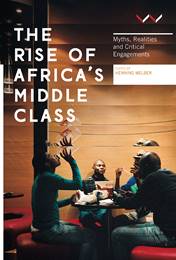
Bibliographic Details of the South Africa Edition (see the Link: http://witspress.co.za/catalogue/the-rise-of-africas-middle-class/):
Editor(s): Henning Melber
Publication Date: March 2017
Dimensions and Pages: 234 x 156 mm; 288 pp; Softcover
Paperback EAN: 978-1-77614-082-4
Rights: Southern Africa
Recommended Price (ZAR): 350.00
Professor Karl Wohlmuth has presented in 2014 the study “African Lions, African Tigers, and Emerging African Middle Classes – A Very Sceptical Note Extended” (Link: http://www.iwim.uni-bremen.de/files/dateien/1401_african_lions_sceptical.pdf). In this study the “Africa Rising” story is critically examined and is also related to the debate about the growth of Africa’s Middle Class. The study was published in the journal “Berichte” of the Research Institute of the IWVWW in Berlin in the Number 205, October-December 2014, Volume 24. See the bibliographic details below:
Wohlmuth, Karl, 2014, African Lions, African Tigers, and Emerging African Middle Classes – A Very Sceptical Note Extended, pp. 4-32, in: Berichte, Oktober - Dezember 2014, 24. Jahrgang, Nr. 205, Schwerpunktthema des Heftes: Diskussionswert: sich differenzierendes Afrika, Geopolitik und Menschenrechte, internationales Krisenmanagement und das wesentlich Unsichtbare, Berlin: Forschungsinstitut der IWVWW e. V.
An extended version of the essay “Africa's Middle Class, Africa's Entrepreneurs and the Missing Middle” was published in November 2016 in an IWIM Publication Series (see for bibliographic details): Wohlmuth, Karl/ Oluyele Akinkugbe, 2016, Middle Class Growth and Entrepreneurship Development in Africa – Measurement, Causality, Interactions and Policy Implications, November 2016, 36 S., "Weiße Reihe" des IWIM, Andreas Knorr, Alfons Lemper, Axel Sell, Karl Wohlmuth (Hrsg.): Materialien des Wissenschaftsschwerpunktes "Globalisierung der Weltwirtschaft", Bd. 43, November 2016, ISSN 0948-3837 (ehemals: Materialien des Universitätsschwerpunktes "Internationale Wirtschaftsbeziehungen und Internationales Management"). PDF and Download are available at: PDF and Link to the IWIM Publication Series: http://www.karl-wohlmuth.de/weisse_reihe/.
This extended contribution is accepted for publication in the journal “Berichte” for Number 1, 2017. It is a forthcoming publication.
Professor Reuben A. Alabi, Full Professor of Agricultural Economics since March 2017 at the Ambrose Alli University, Ekpoma, Edo State, Nigeria, will continue his researches in Bremen for three more years (2018 - 2020). He is already in Bremen since 2015, at the invitation of Professor Karl Wohlmuth who is also consultant and senior project adviser to these research projects. He will undertake in the coming years researches on various issues of development in Nigeria:
Research Project One: ‘Cassava Production, Processing, Fortification and Acceptability in Nigeria’, a publication for Volume 20 of the African Development Perspectives Yearbook. He is also one of the Volume Editors and Unit Co-Editor for the Unit on Nigeria in Volume 20. Volume 20 will appear for 2018, while Volume 21 will be ready for 2019. Professor Alabi will also assist in the work for Volume 21.
Research Project Two: He will conduct researches on ‘Impact of State Government Public Expenditures on Yam Productivity and its Implications on Food Security in Nigeria’. In this context he will also organize a Policy Workshop in Nigeria. The intention is to inform the policymakers, the civil society, and academia about the policy implications of these researches. Focus is on the role of state level public finances in contrast to analyses of the federal level public expenditures.
Research Project Three: He will also conduct researches on ‘How to Address Youth Unemployment in Nigeria by Using Agricultural and Business Technologies’. Also this project will lead to a Policy Workshop in Nigeria. The intention is to inform the policymakers, the civil society and academia about these researches. As growth has not contributed to employment creation in Nigeria, this project will link directly employment policies for the youth and agricultural development policies to enable young entrepreneurs.
Recent researches by Professor Alabi in Bremen have led to important international publications (a full list of publications is contained in the Letter of Intentions submitted for the Research Programme 2018-2020):
International Publication One: AGRODEP
No. 0036 - Does an Inorganic Fertilizer Subsidy Promote the Use of Organic Fertilizers in Nigeria?
AGRODEP Author:
Alabi, Reuben Adeolu
Abu, Godwin Anjeinu
Authors:
Reuben Adeolu Alabi, Oshobugie Ojor Adams, Godwin Abu
Publisher:
AGRODEP
Abstract:
This study examines the crowding-out or -in effect of organic fertilizers as a result of the inorganic fertilizer subsidy program in Nigeria. The study made use of the Nigeria General Household Survey (GHS) dataset from 2010-2011, which contains 5,000 farmers. We estimate the probability and intensity of organic and inorganic fertilizer use conditioned on the amount of fertilizer subsidy accessed by the farmers using Probit and Tobit IV methodologies. The results reveal that organic fertilizer is being used as an alternative to inorganic fertilizer and that the farmers who are not able to access the fertilizer subsidy rely on organic fertilizer. Apart from revealing the crowding-out effect of the fertilizer subsidy on the use of organic fertilizers, our findings also bring to the fore the role that transportation and regional constraints play in stimulating inorganic fertilizer application among farmers outside the fertilizer subsidy scheme. We conclude with some recommendations on how to increase organic fertilizer use and promote integrated soil fertility management among farmers in Nigeria.
The full paper is available at:
International Publication Two: AFRICAN ECONOMIC RESEARCH CONSORTIUM (AERC), NAIROBI, KENYA

Title: THE PRO-POORNESS OF FERTILIZER SUBSIDY AND ITS IMPLICATIONS ON FOOD SECURITY IN NIGERIA Authors: ALABI, Reuben Adeolu Department of Agricultural Economics, Ambrose Alli University, Ekpoma Edo State, Nigeria, e-mail: bayobimb@yahoo.com and
ADAMS, Oshobugie Ojor Department of Agricultural Economics, Ambrose Alli University, Ekpoma Edo State, Nigeria, e-mail: bugieadams@yahoo.com
FINAL REPORT SUBMITTED TO The AFRICAN ECONOMIC RESEARCH CONSORTIUM (AERC), NAIROBI, KENYA
Abstract:
We examined the pro-poorness of the newly introduced e-wallet fertilizer scheme in Nigeria. The study made use of the Nigeria General Household Survey (GHS)-Panel Datasets of 2010/2011 and 2012/2013 which contain 5000 farmers in each the panel and supplemented it with Federal Ministry of Agriculture and Rural Development (FMARD) data on fertilizer subsidy. We determined the pro-poorness of the scheme by estimating its benefit incidence and concentration index, and estimated the impact of the scheme on fertilizer use, output and yield of the participating farmers using the propensity score matching (PSM) methodology. We found that the e-wallet scheme was able to register about 70% of the expected number of registered farmers, while the roll-out and redemption rates stood at 79% and 69% respectively. The proportion of farmers who used fertilizer in Nigeria declined from about 39% in the pre-wallet scheme to 38% during the e-wallet scheme. The percentage of farmers that used subsidized fertilizer also decreased from 13% in the pre-wallet era to 12% during the e-wallet scheme. We indicated that the concentration indices of fertilizer subsidy before and during the e-wallet schemes were 0.0328 and 0.0168 respectively. Since they were positive, it means that their distributions are not pro-poor, but fertilizer subsidy with the e-wallet scheme is more pro-poor than the pre e-wallet scheme because it has a lower concentration index. While the largest-scale farmers shared 23% in the fertilizer subsidy before and during the e-wallet schemes, the share of the smallest-scale farmers were 18% and 19% in the fertilizer subsidy before and during the e-wallet scheme respectively.
This may explain the relative pro-poorness of e-wallet over the pre-e-wallet scheme. However, the e-wallet scheme was not pro-poor in absolute terms because the share of the largest farm size group of farmers was higher than the share of the smallest farm size group during the e-wallet scheme. The study showed further that the share of the rural area in the fertilizer subsidy was about 39% and 41% before and during the e-wallet scheme respectively. The study demonstrated that the fertilizer subsidy distribution is not pro-poor in the rural area and in the South-South, North-West and North-Central regions of Nigeria. The study revealed further that the participating farmers in the e-wallet fertilizer scheme used more fertilizer than non-participating farmers in the range of 278kg to 293kg per farmer. The output of the participating farmers was significantly higher by 827kg but there were not significant differences in their farm productivities. The study revealed that the small and the smallest farm holders who contributed about 70% of the total yield of all the farmers shared only 39% of the subsidized fertilizer during the e-wallet fertilizer scheme. This non-pro-poor distribution of subsidized fertilizer has been implicated for non-significant differences in the farm productivities of participating and non-participating farmers in the scheme. The study concluded that, though the e-wallet scheme is more innovative and transparent than the previous fertilizer subsidy scheme, some factors that limited the pro-poorness of the past fertilizer subsidy scheme are still inherent in the e-wallet scheme. In order to improve the impact of the scheme on food crop productivity and on food security, the study recommended how the pro-poorness of the e-wallet scheme can be addressed with special reference to the rural area, the South-South, the North-West and the North-Central regions.
See the Final Report to AERC by the Authors: PDF AERC Contribution
Competing Successfully for International Research Awards
Professor Alabi holds various research awards and international scholarships: Research Grant from Bilateral Cooperation in Education and Research (Internationales Büro des BMBF, Bonn, Germany; Georg Forster Research Fellowship Award of the Alexander von Humboldt Foundation (AvH Foundation), Bonn, Germany; Innovative Research Grant from African Growth & Development Policy Modelling Consortium (AGRODEP-IFPRI), Washington D. C., USA; Research Grant from the African Economic Research Consortium (AERC), Nairobi, Kenya; Research Grant by the Partnership for Economic Policy (PEP) Research Network, Quebec Canada; and Excellence in Publication Grant from African Growth & Development Policy Modelling Consortium (AGRODEP-IFPRI), Washington D. C., USA). He also has applied for funding for the projects in the new research period in Bremen (2018 – 2020). Professor Karl Wohlmuth is advising the research activities of Professor Alabi now since 2004. In this year the cooperation started between the universities in Ekpoma, Nigeria and in Bremen, Germany at the occasion of a Research Workshop on African Development.
Professor Alabi has published in most of the publication series of IWIM (Book Series, African Development Perspectives Yearbook Series, Blue Discussion Paper Series, and White Discussion Paper Series).
Professor Karl Wohlmuth is invited as a speaker to the Victoria Falls Global Conference of ECOSOC in preparation of the 2017 Special Meeting to be held at the United Nations Headquarters in New York City. ECOSOC is intensively working now on the global implementation of the Sustainable Development Goals (SDGs). As SDG 9 has great relevance for poverty eradication, the complex issues are discussed in various Global Conferences. Professor Karl Wohlmuth is one of the speakers at the Global Conference in Victoria Falls, Zimbabwe.
The 2017 Special Meeting of ECOSOC on “Innovations in Infrastructure Development and Promoting Sustainable Industrialization” will highlight the following issues (see the link: https://www.un.org/ecosoc/en/events/2017/2017-special-meeting-ecosoc-%E2%80%9Cinnovations-infrastructure-development-and-promoting):
WHAT? The 2017 Special Meeting of ECOSOC will address the theme “Innovations in Infrastructure Development and Promoting Sustainable Industrialization”, putting the spotlight on the relevance of Sustainable Development Goal 9 (SDG-9) and its inter-linkages with other Goals and targets. Two preparatory events – in Dakar, Senegal (26 March) and in Victoria Falls, Zimbabwe (24-26 April) – were organised in the lead-up to the Special Meeting.
WHEN? The 2017 Special Meeting will be held on 31 May 2017, in the ECOSOC Chamber at UN Headquarters, New York.
WHY? Resilient infrastructure and sustainable industrialization are key enablers of poverty eradication and can promote inclusion, connectivity and equality within societies. However, these sectors can be complex and expensive to develop, especially in countries in Africa and countries in special situations. The Special Meeting will aim to bring the challenges involved to the attention of national, regional and international actors, and to forge solutions to bridge the gaps in infrastructure, industrialization and innovation across countries.
WHO? The 2017 Special Meeting will bring together high-level representatives of Member States, representatives of the United Nations system, international organizations, civil society and other non-governmental organizations, academia and the private sector. The overall initiative is supported by a range of UN entities including FAO, OHRLLS (UN Office of the High Representative for the Least Developed Countries, Landlocked Developing Countries and Small Island Developing States), OSAA (Office of the Special Adviser on Africa), UNCTAD, UNDP, UNECA, UNHABITAT, UNIDO and WIPO, and engaging other organizations such as the African Development Bank, the African Union, NEPAD and representatives from academia, civil society and the private sector.
Invitation: Professor Karl Wohlmuth was invited by His Excellency, Mr. Frederick Musiwa Makamure Shava, President of the United Nations Economic and Social Council (ECOSOC) to speak at the „Global Expert Meeting on Agriculture and Agro-industries Development towards Sustainable and Resilient Food Systems“ in Victoria Falls, Zimbabwe about “Strategies towards Industrialization based on Agricultural Development - Lessons learned from the 3ADI model and moving beyond 3ADI”. The Conference is held on 24-26 April 2017, arranged by ECOSOC, FAO, UNIDO, and other UN organizations.
Further Information:
See the Programme of the Victoria Falls Global Conference of ECOSOC: PDF ECOSOC-Draft Programme
See the Press Release of IWIM at the occasion of this Event: PDF Press Release of IWIM on ECOSOC
See the Link to the ECOSOC working programme on SDG 9 with meetings in Dakar, Victoria Falls and New York City (United Nations Headquarters): https://www.un.org/ecosoc/en/events/2017/2017-special-meeting-ecosoc-%E2%80%9Cinnovations-infrastructure-development-and-promoting
See the Link to the Special Meeting of ECOSOC on “Innovations in Infrastructure Development and Promoting Sustainable Industrialization” at: https://www.un.org/ecosoc/en/events/2017/2017-special-meeting-ecosoc-%E2%80%9Cinnovations-infrastructure-development-and-promoting
Der Ingenieur und Ökonom Diplom-Ingenieur und MBA Yves Bagna aus Kamerun hat einen „Porter Competitiveness Index“ zur Bewertung der wirtschaftlichen Attraktivität afrikanischer Länder erarbeitet. Die Ergebnisse wurden mit dem „Global Competitiveness Index“ des World Economic Forum (WEF) abgeglichen. An diesem Projekt hat Professor Karl Wohlmuth als Berater mitgewirkt. Die Studie ist jetzt im Forschungsinstitut der Internationalen Wissenschaftlichen Vereinigung Weltwirtschaft und Weltpolitik e. V. Berlin (IWVWW) als Buch erschienen. Im nächsten Heft der Institutszeitschrift „Berichte“ (Nummer 1, 2017) wird eine prägnante Kurzfassung der Studie unter dem Titel „Zielmärkte in Afrika, Eine Untersuchung der wirtschaftlich attraktiven Länder in Afrika“ erscheinen. Yves Bagna hat seinen Ansatz dem Team von Professor Michael Porter an der Harvard Business School, Institute for Strategy and Competitiveness (ISC), vorgestellt (Link: http://www.isc.hbs.edu/Pages/default.aspx). 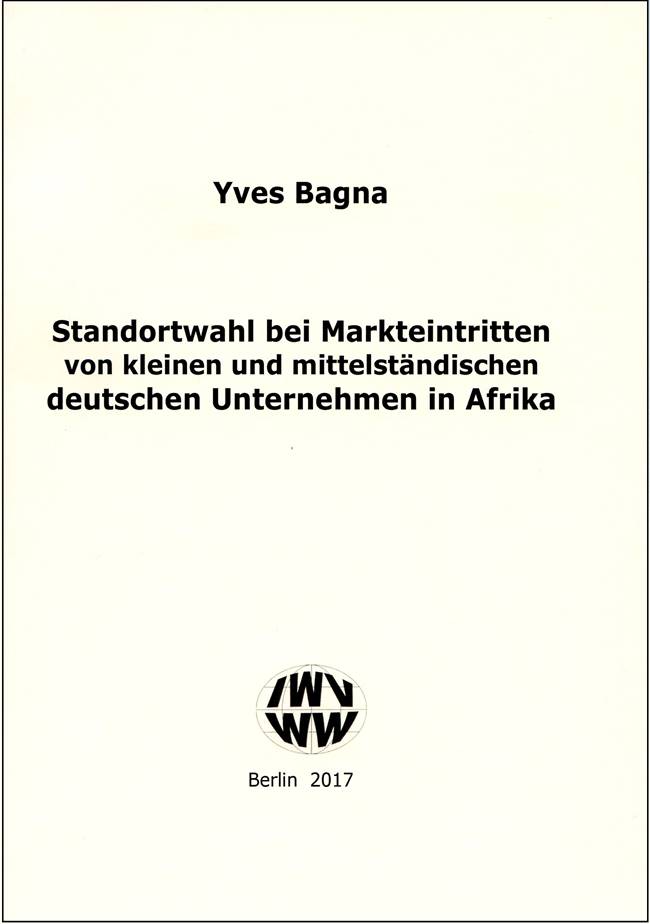
Vgl. zu den Kurzfassungen und bibliographischen in Deutsch, Französisch und Englisch die folgenden Einträge:
Zukunftsmarkt Afrika: Welche Länder sind für eine Geschäftsanbahnung besonders interessant?
Yves Bagna legt eine neue Studie zu afrikanischen Zukunftsmärkten vor und entwickelt einen „Porter Competitiveness Index“. In diesem faktenreichen Buch werden wichtige theoretische Ansätze genutzt, um Aussagen über die Attraktivität afrikanischer Länder für kleine und mittelständische deutsche und andere europäische Unternehmen zu treffen. Unternehmen, die in Afrika investieren wollen bzw. einen Kooperationspartner vor Ort suchen, können den Analyserahmen und die Ergebnisse gut für eigene Bewertungen nutzen. Yves Bagna wurde von Prof. Dr. Karl Wohlmuth, IWIM, Universität Bremen, während der Erstellung der Studie beraten. Die Studie wurde 2017 vom Forschungsinstitut der IWVWW e. V. in Berlin veröffentlicht und kann von dort bezogen werden. Ausführliche Kurzfassungen in Deutsch, Englisch und Französisch geben dem Leser einen kompakten Überblick.
Deutsche Kurzfassung und bibliographische Information (PDF Deutsch)
L‘Afrique marché d’avenir: Quels sont les pays lucratifs pour des activités commerciales?
Yves Bagna présente une nouvelle étude sur les marchés d’avenir en Afrique et développe pour ce but un « Porter Competitiveness Index ». Dans ce livre riche en faits, des instruments théoriques remarquables sont employés dans le but de déterminer les pays attractifs en Afrique pour les petites et moyennes entreprises en Allemagne et dans les autres pays européens. Les entreprises qui veulent investir en Afrique ou qui cherchent des partenaires d’affaires sur place peuvent évidemment utiliser ce cadre analytique pour leurs propres estimations. Yves Bagna a été consulté pendant cette étude par le Prof. Dr. Karl Wohlmuth, IWIM, de l’Université de Breme. L’étude a été publiée en 2017 par l’institut de recherche IWVWW e. V. de Berlin et peut donc être obtenue dans cette institution. Un résumé minutieux du contenu en allemand, en anglais et en français permet au lecteur d’avoir un aperçu succinct.
Französische Kurzfassung und bibliographische Information (PDF Französisch)
Future Markets in Africa: Which countries are particularly interesting for initiating business?
Yves Bagna presents a new study on African future markets and develops a "Porter Competitiveness Index". In this fact-rich book, important theoretical approaches are used to make statements about the attractiveness of African countries to small and medium-sized German (and other European) companies. Companies wishing to invest in Africa or to establish a co-operation with a local partner can use the analysis framework and the results for their own evaluations. Yves Bagna was advised by Prof. Dr. Karl Wohlmuth, IWIM, University of Bremen, during the elaboration of the study. The study was published in 2017 by the Forschungsinstitut of the IWVWW e. V. in Berlin and can be obtained from there. Detailed abstracts in German, English, and French give the reader a compact overview.
Englische Kurzfassung und bibliographische Information (PDF Englisch)
Professor Karl Wohlmuth has contributed to this project with an essay “Towards Transformative Regional Integration and Measuring Integration Progress”, covering the following issues: The Linear Regional Integration Model and the Reality of African Regionalism and Towards a Transformative Regional Integration Model and the Perspectives of Structural Transformation in Africa (see for the Download of a PDF: https://interventionseconomiques.revues.org/3152). This essay is part of the chapter on Regional Experiences, while there are also chapters on African Regionalism and on Economic Policy of Regionalism. The essay by Professor Wohlmuth covers some issues of Volume 18 of the African Development Perspectives Yearbook for 2015/16 with the title Africa's Progress in Regional and Global Economic Integration – Towards Transformative Regional Integration (see the Link: http://www.karl-wohlmuth.de/african_development_perspectives_yearbook/).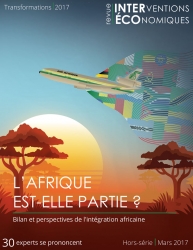
About the Journal (from the journal website):
La revue Interventions économiques / Papers in Political Economy est une revue scientifique qui s'intéresse aux débats théoriques en économie politique et en socio-économie, à l’évolution et aux transformations socio-économiques des sociétés actuelles et aux résultats de recherche menés dans ces divers domaines.
About the new Publication (from the introduction by the co-ordinators of the edition):
“Y faisant face, l’UA a adopté l’Agenda 2063, lequel retient l’intégration du continent comme sa deuxième aspiration majeure : un continent « politiquement uni ». Au-delà de cette perspective cinquantenaire, les trajectoires antérieures et les évolutions récentes de l’intégration régionale africaine méritent un temps d’arrêt pour jeter un regard rétrospectif sur les acquis et se projeter sur l’avenir, à la lumière d’un état des lieux.
C’est l’objet du présent numéro thématique de la Revue Interventions Économiques. Le numéro « spécial Afriques» entend faire le point sur l’intégration régionale en Afrique, cinq décennies après la création de l’Organisation de l’Unité Africaine (OUA) et 15 années après la naissance de l’Union africaine (UA). Il a vocation à contribuer à améliorer la connaissance sur l'intégration régionale en Afrique. Ce faisant, les experts s’y prononcent sur l’impact des régionalismes sur la compétitivité du continent, tout en essayant de situer les économies africaines au sein de l’économie mondiale. De plus, les lecteurs trouveront dans ce numéro des réflexions qui tentent de faire le suivi des efforts en matière d’intégration africaine, de repérer les opportunités et les menaces inhérentes tant aux contextes national (aspirations au statut d’émergence) et régional qu’à l’environnement mondial. Une place importante est également faite non seulement à l’évaluation des acquis en termes de bien-être et de qualité de vie des populations, à l'identification de quelques pratiques exemplaires, mais aussi à une projection sur l’avenir dans des perspectives à moyen ou long terme pour l’émergence et l’intégration africaines.”
Charlie Mballa et Issiaka Mandé
Major Issues (see about regular current issues of the journal: https://interventionseconomiques.revues.org/3152):
The journal has published on relevant political economy themes (on the organization of the global economy and on regional and national political and economic issues)-
Die drei Entwicklungsökonomen Hans-Heinrich Bass (Bremen), Robert Kappel (Hamburg/Berlin) und Karl Wohlmuth (Bremen) haben im Auftrag der Friedrich-Ebert-Stiftung (FES) Tunesien eine Studie zu den Ansatzpunkten einer nationalen Beschäftigungsstrategie für Tunesien verfasst. Angesichts der wachsenden Arbeitslosigkeit und der Ineffektivität der nationalen Beschäftigungspolitik in Tunesien sind Impulse für eine Neuorientierung in der derzeitigen Entwicklungsphase des Landes besonders wichtig (vgl. dazu die Links zur FES Tunesien: http://library.fes.de/pdf-files/iez/12921.pdf und zur digitalen Bibliothek der FES: http://www.fes.de/cgi-bin/gbv.cgi?id=12921&ty=pdf ).
Aus der Studie zitiert:
„Wirtschaftliche Probleme und soziale Ungerechtigkeiten lösten im Jahr 2011 die Revolution in Tunesien aus. Seither hat sich viel in Tunesien getan; die demokratische Entwicklung des Landes wird international gelobt. Doch wirtschaftliche Reformen wurden bislang kaum unternommen. Insbesondere junge Tunesier_innen und Bewohner_innen des Landesinneren warten noch immer auf eine wirtschaftliche und soziale »Dividende« der Revolution. Ohne neue Impulse in der Beschäftigungspolitik gerät der politische Prozess in Tunesien in Gefahr.
Die beste Form, um langfristige soziale Gerechtigkeit und gesellschaftliche Stabilität zu erreichen, ist durch gute, würdige und fair entlohnte Arbeit. In Tunesien herrscht jedoch schon seit langem Unterbeschäftigung und der Anteil prekärer Jobs nimmt rasch zu. Viele Hochschul- und Berufsschulabsolvent_innen finden keine adäquaten Jobs, wohingegen viele andere im stetig wachsenden informellen Sektor tätig sind. Aus diesem Grund braucht Tunesien dringend eine neue Industriepolitik und eine umfassende Beschäftigungsstrategie.
Auswege aus der Beschäftigungskrise Tunesiens sind möglich. Eine effektive Beschäftigungspolitik setzt jedoch die Stärkung des Unternehmenssektors voraus, insbesondere durch die Förderung kleinerer und mittlerer Unternehmen. Darüber hinaus sind neue Formen der Integration der tunesischen Wirtschaft in regionale und globale Wertschöpfungsketten durchzusetzen. Nur durch eine breit angelegte Reindustrialisierung können die nötigen Jobs geschaffen und nachhaltig gesichert werden.“
Erstens werden in der Studie Grundlagen einer kohärenten, inklusiven und nachhaltigen Wirtschafts- und Sozialpolitik für Tunesien vorgestellt. Dabei kommen der Privatsektor-Entwicklung und dem inklusiven Wachstum besondere Bedeutung zu. Die Dynamik in urbanen Zentren ist für die Beschäftigungsschaffung und für ein inklusives Wachstum stärker zu nutzen. Eine neue Industriepolitik kann inklusives Wachstum und Beschäftigungsschaffung unterstützen. Kleine und mittlere Unternehmen müssen anders als bisher offensiv gefördert werden.
Zweitens legt die Studie dar, dass die Integration Tunesiens in globale und regionale Wertschöpfungsketten durch wirtschafts- und handelspolitische Maßnahmen deutlich verbessert werden kann. Ein großes Beschäftigungspotential einer vertieften Integration ist erkennbar. Allerdings sind industriepolitische Voraussetzungen für eine erfolgreiche globale und regionale Integration erst noch zu schaffen. Die einseitige und enge Konzentration in sektoraler und geographischer Hinsicht ist zu überwinden.
Drittens zeigt die Studie, dass Auswege aus der Beschäftigungskrise möglich sind, wenn durch eine nationale Beschäftigungsstrategie die fehlende Dynamik der Arbeitsmärkte korrigiert wird. Aber auch ein neues Management der De-Industrialisierung ist notwendig, weil in den letzten Jahren viele Jobs im Sektor der verarbeitenden Industrie verloren gegangen sind. Die Beschäftigungskrise kann überwunden werden, wenn eine neue Industriepolitik die Möglichkeiten der Reindustrialisierung ausschöpft. Die Beschäftigungsschaffung in Tunesien kann durch vier Pfade der Reindustrialisierung voran gebracht werden. Schließlich sind aber Ausrichtung und Umsetzung der Beschäftigungsstrategie als gesamtgesellschaftliche Aufgabe zu verstehen; alle Stakeholder des Beschäftigungssystems müssen beteiligt werden, um einen Erfolg zu ermöglichen.
. . . . . . . . . . . . . . . . .
Bibliographische Angaben zur Studie:
Ansatzpunkte einer nationalen Beschäftigungsstrategie für Tunesien / Hans-Heinrich Bass, Robert Kappel und Karl Wohlmuth. - Berlin : Friedrich-Ebert-Stiftung, Naher / Mittlerer Osten und Nordafrika, November 2016. - 17 Seiten = 215 KB, PDF-File. - Electronic ed.: Berlin : FES, 2016, ISBN 978-3-95861-599-1 http://library.fes.de/pdf-files/iez/12921.pdf
Friedrich-Ebert-Stiftung/FES International Naher/Mittlerer Osten Nordafrika: https://www.fes.de/international/nahost/inhalt/publ_tunis.php
Die Studie wird derzeit ins Französische und ins Arabische übersetzt.


